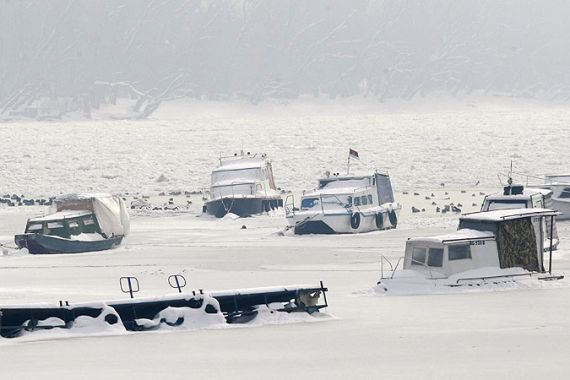Cold paralyses life across much of Europe
Extreme weather hits normal life as 2,860km-long Danube river is wholly or partially frozen.

Europe continues to battle severe freezing weather that has killed hundreds of people, with transport and navigation services badly hit across the continent cutting off tens of thousands of people.
Thick ice has closed hundreds of kilometres of the Danube river in half-a-dozen countries and confined scores of ships to port on the busiest European waterway, officials said on Thursday.
Keep reading
list of 4 itemsCould shipping containers be the answer to Ghana’s housing crisis?
Thousands protest against over-tourism in Spain’s Canary Islands
Holding Up the Sky: Saving the Indigenous Yanomami tribe in Brazil’s Amazon
The 2,860km-river, which flows through nine countries and is vital for transport, power, irrigation, industry and fishing, was wholly or partially blocked from Austria to its mouth on the Black Sea.
With ice floes in the river around Belgrade up to half a metre thick, the Belgrade port authority said that all vessels on the 600km stretch through Serbia were safely in port.
A government ban on navigation on all the country’s waterways was expected to remain in place for about 10 days, Pavle Galic, the deputy infrastructure minister, told the Beta news agency.
Bulgarian authorities, who have also banned all navigation on the river, reported tthat 50-90 per cent the Danube was frozen.
Britain is also expecting heavy snow, up to 8cm on Thursday, while flooding in Greece has left dozens of homes under water after the Evros river burst its banks.
Villages trapped
Italy braced for another wave of freezing weather on Thursday, even as soldiers worked to free villages trapped in three metres of snow, with the death toll from the cold snap already at 43.
Local authorities in Rome have begun distributing 4,000 spades for local residents. They have boosted the city’s stocks of salt to 1,000 tonnes and have dozens of snow ploughs at the ready after criticism of previous preparations.
Forecasts said freezing winds were set to pick up later on Thursday and bring more snow on Friday and Saturday to Rome.
Germany has been forced to call upon its reserves for producing electricity for the second time this winter as Europe is gripped by a severe cold snap, officials said.
| Al Jazeera’s Jonah Hull reports on Serbia’s cold snap |
The country’s four main power operators requested that the reserve generator at a coal-powered plant in southern Germany and two plants in Austria be activated, the regional environment ministry in the southern state of Baden-Wuerttemberg said.
The Balkan nation, Serbia, one of the countries that has banned navigation on all of the Danube’s waterways, is also struggling to maintain its power system amid record low temperatures.
Al Jazeera’s Jonah Hull, reporting from the central town of Kraljevo, said the government declared a state of emergency two days ago and had deployed the military to help victims of the cold snap.
“The military has been drafted to do what it can to help those 70,000 people stranded in towns and villages in some 38 municipalities across the country,” he said.
“Helicopters have been flown into those areas to bring medical supplies and food to those stranded and those who have succumbed to the cold weather.
“Of course, many places have no power, no phone lines, which were brought down by heavy winds and snow.”
The state power company has warned of restrictions unless electricity consumption is reduced.
There are also fears that ice that has formed on rivers could jeopardise power production at hydroelectric plants. Authorities also fear flooding and plan to use explosives to break the ice.
Temperatures in Serbia dropped to minus 27 Celsius in some areas on Thursday.